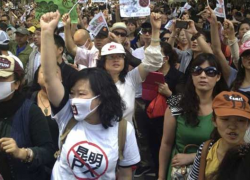
The Chinese oil port in the Arakan State’s coastal city of Kyaukpyu and the associated country-crossing pipeline to China’s Yunnan Province face a significant issue that could slow down operations considerably.
Opposition from the Chinese people and environmental issues have delayed construction of the refinery that is supposed to receive nearly half of the 22 million tons of crude oil that could be sent through the pipeline each year. The oil from Africa and the Middle East was scheduled to start flowing soon.
Reports indicate that the receiving refinery may now be scuttled and a new refinery project started elsewhere.
Planned to be located outside the city of Kunming, the Anning refinery was supposed to be finished in early 2014. It was due to take 200,000 barrels of crude per day from the pipeline to make gasoline and to supply a petrochemical plant next door. The pipeline’s maximum capacity is 440,000 barrels per day, according to the China National Petroleum Corporation (CNPC), the company that built it.
But Chinese residents of Kunming by the thousands staged a protest — something unusual in China — during May and June. They oppose the refinery itself and the CNPC’s desire to make half a million tons of the carcinogenic chemical Paraxylene (PX), used for making plastic bottles and polyester.
CNPC claimed that environmental studies showed no danger to the surrounding population from air pollution. Still, China’s Ministry of Environmental Protection in August said that it would suspend environmental approval processes for the refinery project and another planned by Sinopec, also a Chinese government-owned company.
For some time, it was unclear what would become of the project, but a diplomat at the Chinese embassy in Burma has said in recent weeks that the project will be located elsewhere.
It isn’t known when the Burmese oil pipeline will begin operations, Embassy Third Secretary Huo Wenjun told the Burma Times. The uncertainty, he said, is because of the delay in the oil refinery’s construction. Originally, the refinery was to be built in Kunming. Now, it will be “elsewhere in the Yunnan province”.
CNPC is also in the process of building oil storage tanks at the transshipment terminal in Kyaukpyu, according to local reports from that area. That project is believed to involve 12 tanks with a capacity of 100,000 cubic meters each, according to the Reuters news agency. That would provide storage for all the oil the pipeline could transport if operated at maximum capacity for 17 days — or about 7.5 million barrels.
One analyst said that the CNPC could send the oil being sent through the pipeline to other locations in the southwestern part of China. But pipeline infrastructure elsewhere in Yunnan is very limited. Unless a quick way of moving the oil could be found, a backlog would quickly develop at the terminal.
The refinery at Kunming was intended to supply half the gasoline and diesel that the city needs and also feed to other cities in Yunnan that are now having to import their fuel oil from elsewhere in China.
The Kyaukpyu Social Network is meanwhile campaigning for details about whether safety measures are in place that would limit or prevent an oil spill near their area or in the coastal waters. They also want access to fishing grounds near the terminal that are now restricted and unavailable to locals.
The network is requesting communication from the Burmese president’s office, the Chinese company and from the Chinese embassy, but they have received no responses.
The CNPC Burma pipeline is the first that pumps oil into China that isn’t directly linked with an oil field. The Beijing business magazine Caijing has said that operation of the pipeline is uneconomical because of the added costs associated with bringing the crude oil by ship to Kyaukpyu before introducing it into the pipeline.
The CNPC is required to pay Naypyidaw $13.6 million a year in rent for the pipeline as well as $1 per ton of crude that flows through it. That would be $22 million if the pipeline operates at full capacity — and nothing if it doesn’t operate at all.

